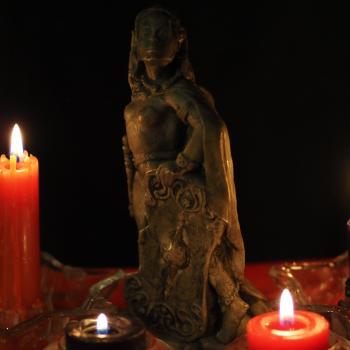Lectionary Reflections
Philippians 4:6-7
October 12, 2014
There are a lot of things we can do ourselves. Home Depot, Lowe's, and other companies specialize in selling products to people who want to do their projects themselves. Their slogans seek to inspire confidence in people that they can do it themselves!
Lowe's has had several slogans in the past decade. "Improving Home Improvement" gave way, in 2003, to "Let's Build Something Together," which gave way in 2012 to "Never Stop Improving."
Home Depot, Lowe's chief competitor in the home improvement market, has had a few slogans of its own over the years. Until recently, it was "You can do it, we can help." In 2012 that slogan was replaced by "Let's do this!"
I used to regard Philippians 4:6 ("Do not worry about anything") as a sort of home Improvement slogan. I would read it and try to psyche myself up. "Let's do this! No anxiety! Who needs it? I am a competent adult. I just need to breathe deeper, summon more faith, and I can achieve this anxiety-free life Paul talks about. Let's do this!"
I can psyche myself up in other areas of life. So why do I struggle with actualizing peace of mind in my own soul?
I go to a fitness class twice a week taught by an excellent instructor. She is both fit and motivating. She is so pleasant that we don't even hate her when she is making us do the tenth round of squats that are the reason getting up and down from my writing chair today is so painful.
When we are flagging in energy in the middle of a round of chest presses or push-ups, she'll call out "C'mon, people! You've got this!" And I can't deny that it has an energizing effect. Class members will call out things like "Yeah!" and "Woo-hoo!" I don't call out anything. I'm busy trying to keep breathing, but I do feel a surge of internal confidence. "I've got this! I can do this!"
That's an example of something I can psyche myself up to do because the abilities lie within me if I'll just summon them. There are other things that I might be able to do but that it would be so much better to have someone else do. We had a bad storm in our area a few weeks ago. The result is that lots of houses in our neighborhood have to have their roofs redone. Could I do this? It is humanly possible, I suppose, but we are hiring a roofing company that knows what they are doing.
The Perkins Center for Preaching Excellence, a newly launched Center at the seminary where I teach, needs a website. Could I design and implement it? It would be humanly possible, perhaps, with lots of special training and trial and error. It is conceivable that I could do this. But we are hiring a local web design company to do this important work. It is important to recognize when we have come to the end of our natural human abilities and need help from others.
My dad, Robert H. Fowler, Sr., was the author of seven historical novels, a publisher of historical magazines, and an amateur historian. He had many talents, but he wasn't big on fixing things around the house. If the toilet wasn't working, if a shutter had blown off the front of the house, or if the garage door was stuck shut, his motto was "Call somebody!"
That is the motto that needs to replace "Let's do this!" when it comes to the freedom from anxiety Paul is talking about in Philippians 4.
I need to call somebody. I can't pull off not worrying about anything by myself. I would like to "Never stop improving!" in my quest for an anxiety-free mind, but as of today "I haven't got this." I need to call somebody.
And Paul tells us whom to call, because immediately after telling us not to worry about anything, he tells us how this can happen. It is not a human achievement at all. It is a gift from God that we access through constant prayer. I can psyche myself up in other areas of life. But I need God to bring peace to my soul.
I wish Paul had reversed the order of this verse and written it like this instead: "In everything by prayer and supplication with thanksgiving let your requests be made known to God and you will receive the gift of not worrying about anything."
And with all due respect to Paul, maybe he could have gone on to explain things a little more fully. Maybe something like:
"The peace of God, which surpasses all understanding is guarding your heart and your mind in Christ Jesus right now. Whether you feel this at an emotional level or not, this is the truth. So get in the habit of constant prayer, and you will come more and more into contact with this gift of peace. Do not beat yourself up that you have anxious thoughts. This is our common human tendency. Do not suppose, like the Stoics, that you can banish anxiety through self-mastery and be indifferent to the ups and downs of life. Only the Peace of God in Jesus Christ can master your anxieties."
New Testament scholar Stephen F. Fowl, in his insightful commentary on Philippians, points out that Paul's brief teaching about not being anxious probably comes from Jesus' own teachings in Matthew 6:25-34 and Luke 12:22. Jesus is primarily concerned with the disciples' concerns over material goods. He wants them to hear: "Live without anxiety because God cares for you." In Philippians 4, Paul's call to be free from anxiety seems more directed toward anxiety resulting from living in a world hostile to Christianity. (Fowl, 183) The peace of God that comes through prayer counters anxiety because it "guards believers' thoughts and hearts in Christ." The notion of guarding would have resonated with the Philippians. There was a garrison there. Their job was to guard the citizens of Philippi and the interests of the Roman Empire. But their brand of peace, the Pax Romana, can never be a true peace because it is not founded in the God of peace. (Fowl, 184)





